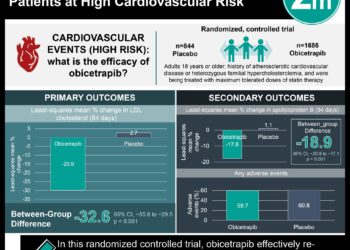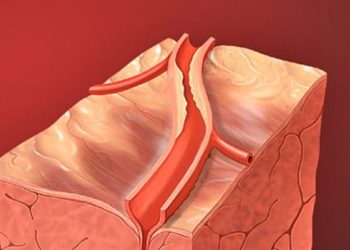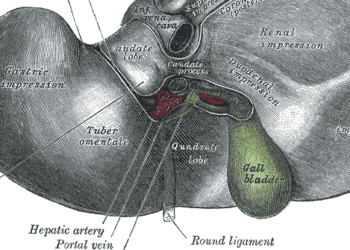Obicetrapib and ezetimibe combination therapy lowers LDL cholesterol in high-risk patients
1. FDC obicetrapib plus ezetimibe significantly decreased LDL cholesterol levels by 48.6% compared to placebo.
2. Serious adverse events were comparable in FDC, obicetrapib, ezetimibe, and placebo groups.
Evidence Rating Level: 1 (Excellent)
Study Rundown: Lowering LDL cholesterol is a proven strategy to prevent atherosclerotic cardiovascular disease (ASCVD). While current therapies help, many patients remain above target LDL levels or cannot tolerate statins. This randomized controlled trial aimed to evaluate the LDL-lowering efficacy of a fixed-dose combination (FDC) of obicetrapib, a CETP inhibitor, and ezetimibe in high-risk patients. The primary outcome of this study was percent change in LDL cholesterol in the FDC group compared placebo, while key secondary outcome was the placebo-adjusted LDL cholesterol change in the obicetrapib monotherapy group. According to study results, FDC significantly lowered LDL cholesterol compared to placebo. Although this study was well done, it was limited by its short duration, which prevents assessment of long-term cardiovascular outcomes and safety.
Click to read the study in The Lancet
Relevant Reading: Safety and Efficacy of Obicetrapib in Patients at High Cardiovascular Risk
In-depth [randomized controlled trial]: From March 4 to July 4, 2024, 716 patients were screened for eligibility across 48 US sites. Included were patients ≥ 18 years with high risk ASCVD resistant to ezetimibe therapy. Altogether, 407 patients (102 each to obicetrapib 10 mg plus ezetimibe 10 mg; obicetrapib 10 mg monotherapy; placebo, and 101 to ezetimibe 10 mg monotherapy) were included in the final analysis. The primary outcome of LDL reduction was significantly greater in the FDC group compared to placebo (-48.6%, 95% confidence interval [CI] -58.3 to -38.9) and ezetimibe (-27.9%, 95% CI -37.5 to -18.4). This was also the case for obicetrapib monotherapy versus placebo (-31.9%, 95% CI -41.6 to -22.1). Serious adverse events were comparable in all groups. Findings from this study suggest that FDC obicetrapib plus ezetimibe is an effective oral option for lowering LDL cholesterol in high-risk patients.
Image: PD
©2025 2 Minute Medicine, Inc. All rights reserved. No works may be reproduced without expressed written consent from 2 Minute Medicine, Inc. Inquire about licensing here. No article should be construed as medical advice and is not intended as such by the authors or by 2 Minute Medicine, Inc.









